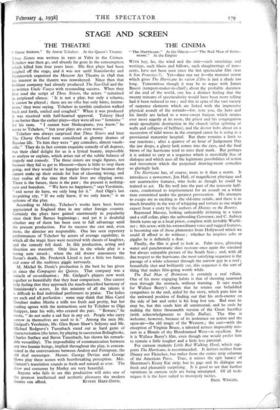STAGE ND SCREEN
THE THEATRE
"Three Sisters." By Anton Tchehov. At the Queen's Theatre
Three Sisters was written in 1900 at Yalta in the Crimea. Tchehov was then 40, and already far gone in the consumption which killed him four years later. His first plays had been laughed off the stage, and it was not until Stanislavsky and Nemirovich organised the Moscow Art Theatre in 1898 that his interest in the theatre was reawakened. Since then that brilliant company had already produced The Sea-Gull and the re-written Uncle Vanya with resounding success. When they first read the script of Three Sisters, the actors "remained in perplexed silence. 'It is not a play, but only a scheme, it cannot be played ; there are no roles but only hints, intima- tions,' they were saying. Tchehov in terrible confusion walked back and forth, smiled and coughed." When it was produced it was received with half-hearted approval. Tolstoy liked it no better than the earlier plays—they were all too" feminine" for his taste. "I cannot bear Shakespeare, you know," he wrote to Tchehov, "but your plays are even worse."
Tchehov was always surprised that Three Sisters and later The Cherry Orchard were considered as gloomy dramas of Russian life. To him they were "gay comedies, almost vaude- ville." They do in fact contain exquisite comedy of all degrees, but their chief delight for us is a lyrical beauty, impossible to analyse or explain, which arises out of the subtle balance of tragedy and comedy. The three sisters are tragic figures, not because they fail to get to Moscow—there is little to stop them going, and they would be no happier there—but because they cannot make up their minds for fear of choosing wrong, and they realise all the time that their lives are slipping away. There is the future, there is the past ; the present is nothing- ness and boredom. "We have no happiness," says Vershinin, "and never do have, we only long for it." And Olga's last despairing cry, "If we only knew, if we only knew," is an epitome of the play.
According to Mirsky, Tchehov's works have been better appreciated in England than in any other foreign country. Certainly the plays have gained enormously in popularity since their first 'Barnes beginnings ; and yet it is doubtful whether any of them has been seen to full advantage until the present production. For its success the cast and, even more, the director are responsible. One has seen repertory performances of Tchehov by actors of average capability, in which all the tragic lines were received with shouts of laughter, and the comedy fell dead. In tiii% production, acting and direction are masterly. Only &lee in the whole play is a wrong note struck ; when the old doctor announces the Baron's death, Mr. Frederick Lloyd is just a little too funny, and some of the audience giggle nervously.
M. Michel St. Denis's production is the best he has given us since the Compagnie des Quinze. That company was a miracle of co-ordination ; Mr. Gielgud's players now work together so beautifully that they bear comparison. One cannot help feeling that they approach the much-described harmony of Stanislavsky's actors. In this ministry of all the talents it is difficult to find individual performers to praise. The ladies are each and all perfection : some may think that Miss Carol Goodner makes Masha a trifle too fresh and pretty, but her reading agrees with the instructions sent by Tchehov to Olga Knipper, later his wife, who created the part. "Beware," he wrote, "do not make a sad face in any act. People who carry sorrow in themselves are used to it." Among the men Mr. Gielgud's Vershinin, Mr. Glen Byam Shaw's Solyony and Mr. Michael Redgrave's Tusenbach stand out as hard gems of characterisation (the latter, by playing in succession Bolingbroke, Charles Surface and Baron Tusenbach, has shown his remark- able versatility). The impossibility of communication between any two human beings, implicit throughout the play, is concen- trated in the conversations between Andrey and Ferrapont, the old deaf messenger. Messrs. George Devine and George Howe play these scenes with heartbreaking perception. Mrs. Garnett's translation sounds as fresh and natural as ever. The decor and costumes by Motley are very beautiful.
Anyone who fails to see this production will miss one of the greatest intellectual and aesthetic pleasures the modern














































 Previous page
Previous page